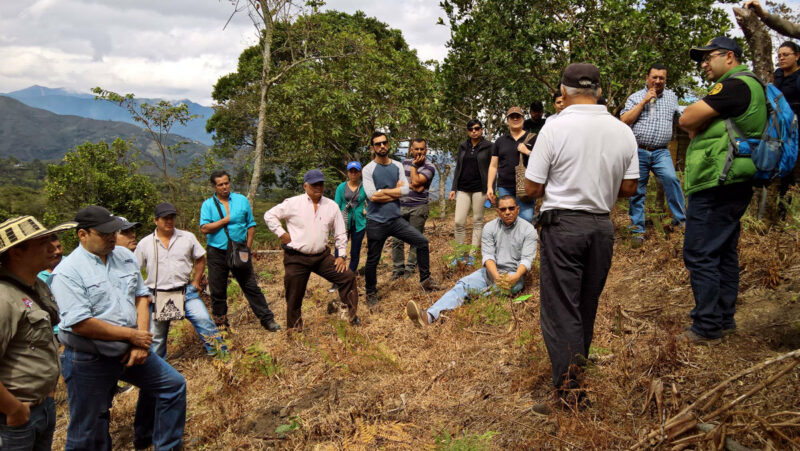Latin-American representatives’ exchange will lead to new Coffee Platforms in the region


From July 16th to 20th, Honduran and Nicaraguan managers, leaders and sustainability coordinators from their respective Coffee Platforms visited the offices of the Sustainable Trade Platform (STP) in Bogotá and the rural area of Cauca department. This exchange represents a milestone for the Honduran Platform, as its members are getting closer to consolidate its governance and road map for the next year.
Coffee partnerships – Key to thrive
During their visit in Bogotá, the group evidenced the need of consolidating partnerships with other organizations. That is why the representatives talked Asoexport, Carcafé, RGC Americas and UTZ-RA in Bogotá; all of them key partners of STP, who shared their experiences and commented on the benefits of being members of Colombian platform, specially the support received from the Technical Secretariat for their sustainability projects. Those meetings also acknowledge some of the challenges of the coffee sector that each of the countries have and must be prioritized.
According to Carlos Isaza, coffee program manager from Solidaridad Colombia, the organization that leads the STP Technical Secretariat, the sustainability challenges for the coffee chain are increasingly complex. “No independent actor has the resources and degree of influence to solve the challenges in the coffee sector. Focus, prioritization of actions and, above all, integration and collaborative work are key to it”, affirmed.

Local action and farmers empowerment
The field visit showed the delegation the benefit of being part of a solid Platform, among the empowerment given to the farmers to thrive together. The group went to the municipalities of La Sierra, Popayán and Cajibío in Cauca, where they met with Asogrupos, AMUCC (Association of Women Coffee Growers of the Cauca) and Café Bio all of them coffee growers’ associations. There, Honduran and Nicaraguan representatives saw concrete actions align with STP’s sustainability objectives: institution of organic coffee growing; adaptation of coffee to climate change with the implementation of ecological stoves; strengthening of associative processes; use of accessible financing models for small farmers (Revolving Credit Funds), water harvest and the implementation of projects managed by the communities themselves. Additionally, the Cauca Coffee Growers Cooperative shared with them the sustainability projects supported by the STP, especially those related to the strengthening of technical teams.
Finally, the group visited the Technological Park of the Café-Tecnicafé, a key partner of the STP for innovation and knowledge management. The tour of its facilities allowed visitors to know routes of action, areas of innovation and products developed for coffee growing.

“It is time to work!”
The activity was a complete success, according to Jorge Eslaquit, Member of the CISA Exporter Platform and Mercon Coffee Group, the exchange was a complete success: “for us it was a great experience, very enriching and it gave us a lot of clarity about the work that we should promote from the coffee platform in Nicaragua,” he commented.
Jacobo Paz, CONCACAFE’s presidential delegate is ready to take action: “It’s time to work! The platform model works, and we learned from the Colombian case that the benefits from its constitution reflects greatly on the small producers.”
With this initiative, GCP and its members, particularly Rainforest Alliance/UTZ and Solidaridad who supported this visit, foster the platform exchange between Honduras, Colombia, and Nicaragua, to share experiences and learn improvement opportunities, scaling up coordination and impact on sustainability investments in those platforms.
Find out more about the Honduran Coffee Platform and the Colombian Coffee Platform
If you have questions regarding engagement in Latin America, contact Guillermo Belloso